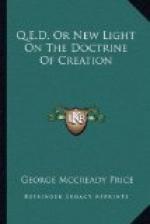Or to use the pungent words quoted with approval by Hugo de Vries at the end of his “Species and Varieties” (pp. 825, 826), “Natural selection may explain the survival of the fittest, but it cannot explain the arrival of the fittest.”
This side of the argument is dwelt upon at some length by Alex. Graham Bell, as reported in a recent interview. He says:
“Natural selection does not and cannot produce new species or varieties or cause modifications of living organisms to come into existence. On the contrary, its sole function is to prevent evolution. In its action it is destructive merely,—not constructive,—causing death and extinction, not life and progression. Death cannot produce life; and though natural selection may produce the death of the unfit, it cannot produce the fit, far less evolve the fittest. It may permit the fit to survive by not killing them off, if they are already in existence; but it does not bring them into being, or produce improvement in them after they have once appeared."[24]
[Footnote 24: World’s Work, December, 1913, p. 177.]
Opposing these Neo-Lamarckians were such prominent scientists as August Weismann, A.R. Wallace, E. Ray Lankester, who strenuously opposed the idea that “acquired characters,” or more precisely parental experience, are ever transmissible. In the subsequent years the greatest variety of experimental tests have been applied to secure the hereditary transmission of any sort of such acquired characters, with uniformly negative results. One of the most elaborate of these experiments was conducted by a German botanist, who transplanted 2,500 different kinds of mountain plants to the lowlands, where he studied them for several years alongside their relatives, natives of these lowlands. He found that their mountain environment had made absolutely no permanent change in their structures or habits, which soon conformed exactly with those of their relatives which had lived in the lowland environment for centuries. Many similar efforts have been made to confirm this doctrine of the transmission of acquired characters; but their universal failure is like that of mechanics in trying to invent perpetual motion.




